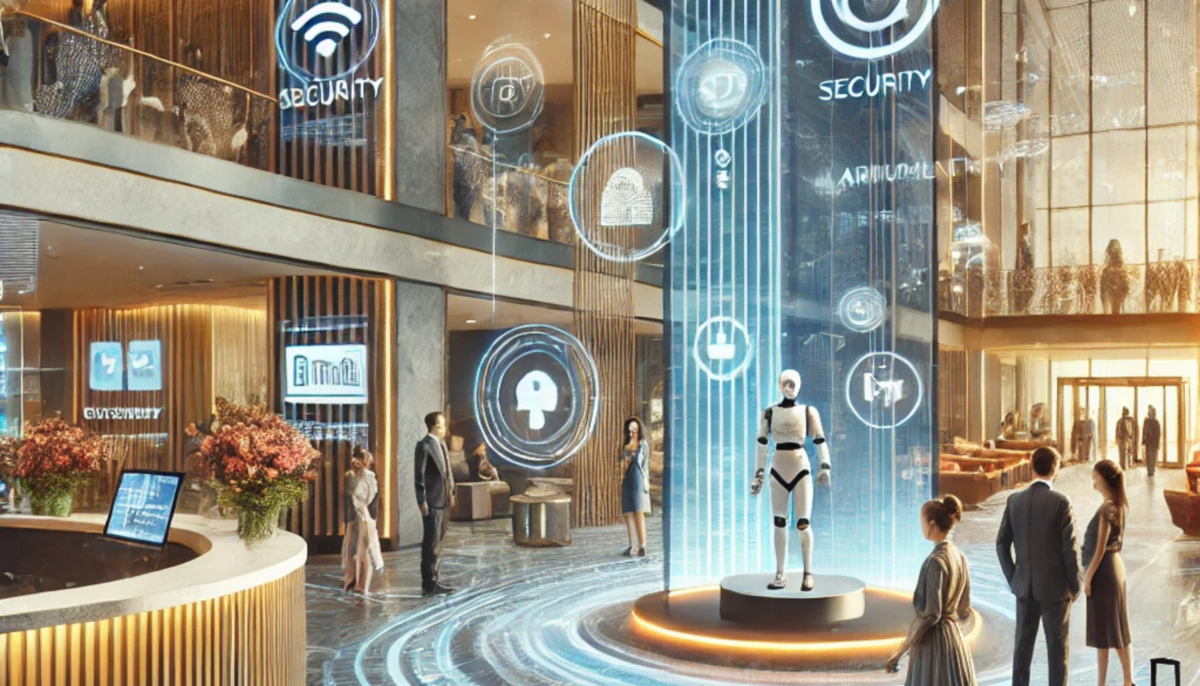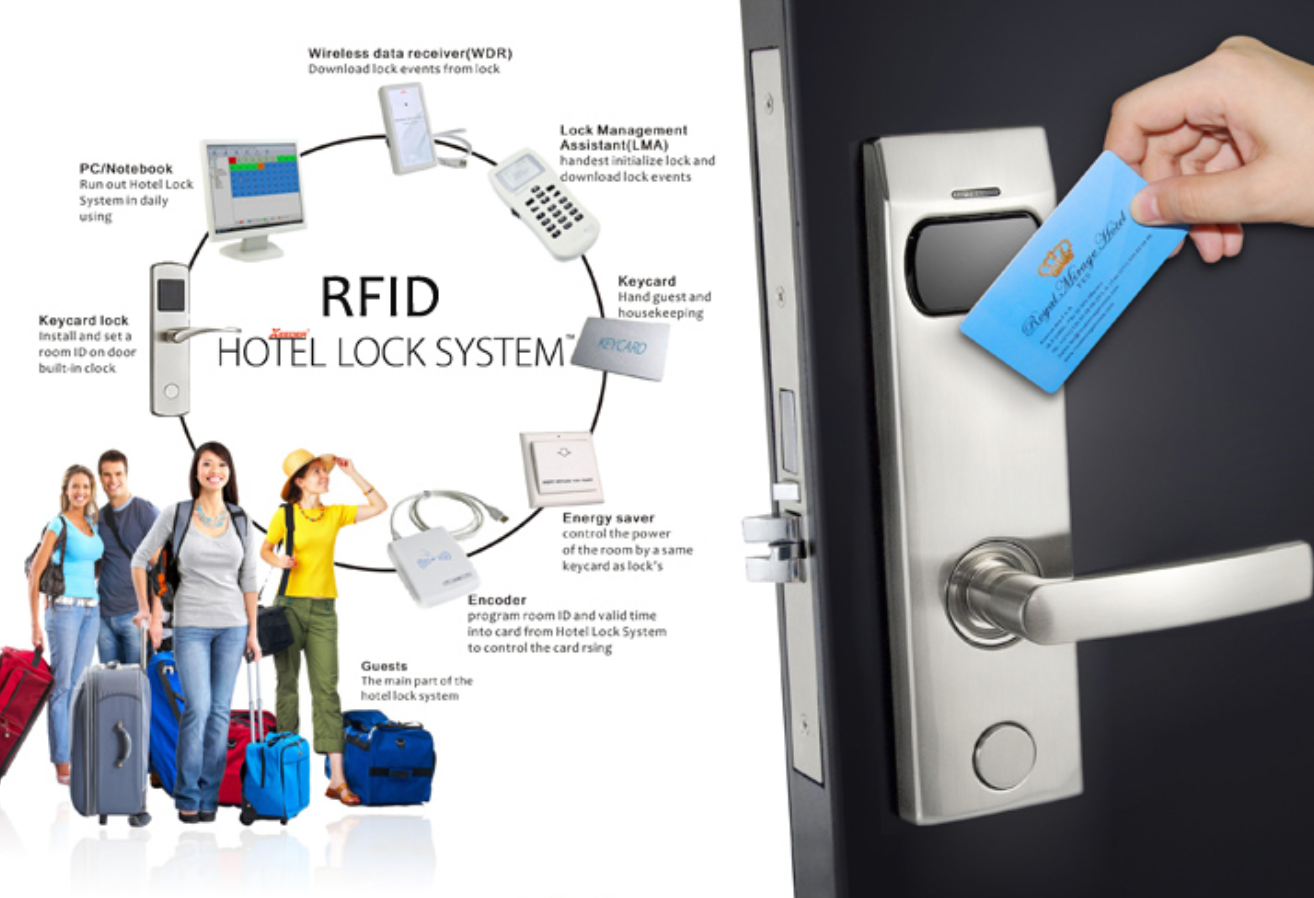
The blog "Revolutionizing Hospitality: Leveraging Cutting-Edge Tech to Thrive in Challenging Markets" explores how the hospitality industry can overcome mounting challenges—rising operational costs, labor shortages, and evolving guest expectations—through strategic adoption of advanced technology.
Focusing on the transformative potential of IoT, RFID systems, cloud-based platforms, and biometric security, the blog highlights how these innovations streamline operations, enhance guest satisfaction, and improve profitability. IoT-enabled systems optimize guest flow, predictive maintenance, and energy efficiency, while RFID and biometric tools strengthen access control, reducing labor costs and enhancing security.
Paul Mourino emphasizes the importance of thoughtful implementation to ensure these technologies align with each property's unique needs. He delves into key case studies, such as Marriott’s IoT-enabled personalized room environments and Hilton’s cloud-based operational efficiencies, to showcase the practical applications of these advancements.
The blog also examines compliance strategies for New York City’s Safe Hotel Act, advocating automated surveillance and employee management software to balance regulatory demands with cost efficiency. It further underscores the global impact of technology, highlighting success stories from tech-forward markets like Florida and major hotel chains adopting cutting-edge systems.
Concluding with a call to action, the blog encourages hospitality leaders to embrace innovation as a necessity for survival and growth, positioning technology as the cornerstone of a more dynamic and resilient hospitality sector.
The hospitality industry faces mounting challenges, from soaring operational costs and labor shortages to economic volatility. In this high-stakes environment, technology has transitioned from a convenience to an essential survival tool. Minor missteps can jeopardize profitability, making innovation critical for success.
This article explores actionable strategies where cutting-edge technology can revolutionize safety, security, and operational efficiency in the hotel business. Drawing from 15 years of leadership experience with top brands like The Peninsula, Marriott, Highgate, Hard Rock, and Hyatt in New York City, I provide insights from firsthand industry experience.
Aligned with the Financial Policy Council’s (FPC) https://financialpolicycouncil.org/ mission to advocate for strategic innovation, this discussion highlights how the hospitality sector can harness technology to navigate today’s challenges and ensure long-term growth and guest satisfaction.
Challenges Facing Hospitality Operators
Hospitality operators face mounting pressures from rising operational costs, labor shortages, and challenges in integrating new technologies. Which technology should be added, and how best can it be integrated? These issues threaten profitability and expose businesses to inefficiencies, security vulnerabilities, and compliance risks. While advanced tools like RFID (radio frequency identification devices) access systems, IOT (internet of things) sensors, and cloud-based management platforms hold promise, ineffective implementation often turns them into liabilities. The convergence of financial strain and technological hurdles creates a perfect storm, jeopardizing operational resilience. To thrive, operators must strategically invest in technology guided by skilled teams, ensuring innovations enhance safety, efficiency, and long-term competitiveness.
Location, Location, Location…
Location is the cornerstone of a property’s success, influencing its profitability and alignment with its business model. Technology should amplify, not diminish, these advantages. For example, in urban spaces, IoT systems can optimize guest flow and operational efficiency, leveraging the property’s location-based strengths. Evaluating a property requires observing its age, building materials, and technological capacity. Walking through space and assessing essentials versus excess helps refine its core fundamentals. In hospitality, a hotel’s location, space, and the technology governing them are critical factors in sustaining profitability and enhancing guest experiences.
Optimizing Access control & Security with Technology
When evaluating a hospitality property, consider how its age impacts its technological infrastructure. Newer properties typically feature the latest technology, while older ones often require cost-prohibitive upgrades. Strategic investment in key systems can significantly enhance efficiency and security.
For example:
CCTV technology has matured, but best practices still favor secure, wired systems over wireless or cloud-based solutions for hotels. While wireless tech may suit stadiums or residential settings, hotel operators must prioritize reliability and control.
Properly managed, technologies like RFID and CCTV enhance safety, efficiency, and guest satisfaction. However, these tools require thoughtful implementation and oversight to maximize benefits and minimize vulnerabilities.
Upgrading Legacy Systems: Transitioning to Modern Platforms
The evolution from legacy systems to modern platforms has dramatically reshaped hospitality technology. Older systems required extensive physical infrastructure—such as copper wiring and bulky servers—that consumed valuable space and became obsolete as technology advanced. Today, cloud-based platforms have eliminated the need for on-site servers, integrating operations seamlessly while offering scalability, real-time data access, and cost savings.
For example, modern communication systems rely on wireless technology powered by remote servers, reducing physical infrastructure needs. However, these systems come with trade-offs, such as reliance on power sources and backup systems during outages. While large companies often have contingency plans, smaller operations may face vulnerabilities during emergencies, highlighting the double-edged nature of technological advancements.
When upgrading from old to new platforms, operators must evaluate how the technology aligns with their property’s unique needs, considering both the benefits and potential challenges. Thoughtful integration ensures that innovation enhances efficiency and resilience rather than introducing new risks.
Access Control
Access control has advanced significantly with mobile keys and biometric systems, revolutionizing security and operational efficiency. Modern systems allow one manager to oversee access control for an entire property remotely, using minimal effort.
Key technologies include:
An example of successful implementation is the use of cloud-based key systems like Assa Abloy, which allows instant updates and reprogramming of keys across a property, ensuring seamless operation. While these systems offer flexibility, they rely on battery-powered locks, necessitating regular maintenance to avoid costly downtime.
Key Takeaways:
By embracing these technologies, properties can enhance both guest satisfaction and operational control.



Revolutionizing Check-In and Access with Mobile and Remote Solutions
Mobile keys and remote check-in processes have revolutionized guest experiences, simplifying check-in/out procedures and improving operational efficiency. By leveraging technology, hotels can reduce wait times and enhance security, benefiting both guests and staff.
For example, Marriott’s adoption of mobile keys allowed guests to use their smartphones as room keys, bypassing front desk interactions and streamlining the check-in process. This technology proved particularly successful when paired with Marriott’s loyalty program, which verified guest identities and payment information to prevent fraud.
While larger hotel chains like Marriott and Hilton have embraced mobile keys, smaller boutique hotels face challenges. Some guests still prefer personal interactions at check-in, and fraud risks remain high without identity verification. For these properties, traditional check-in processes may still be necessary.
Key Benefits:
Mobile key systems, particularly when integrated with loyalty programs, whether Hilton’s ‘Honors’ or Marriot’s ‘Bonvoy’, are reshaping the hotel industry by offering both convenience and security. As technology continues to evolve, remote access and mobile check-in will play an increasingly important role in enhancing the guest experience.
Meeting Guest Preferences with Wireless and Remote Tech
Guests increasingly prefer wireless and remote access tools that enable them to customize their stay. By integrating technology with guest loyalty programs, hotels can offer personalized services that enhance the guest experience. For example, in properties like Hard Rock and Margaritaville, guests can control room features such as temperature, lighting, and music through their smartphones, creating a tailored environment.
The ability to personalize the “sound of their stay” is a unique offering in these brands, allowing guests to choose their preferred music and audio setup. While newer properties can fully integrate these wireless technologies, including smart room controls and remote locks, retrofitting older buildings can be cost-prohibitive due to the required infrastructure and maintenance, such as regular battery replacements and network bandwidth.
Additionally, while guests value these high-tech conveniences, privacy remains a critical concern. Hotels must balance the use of technology with protecting guest confidentiality, particularly as smartphones and social media can easily compromise privacy. Therefore, property managers must ensure staff are trained to handle technology responsibly, safeguarding against potential legal issues.
Navigating Labor Shortages with Tech Solutions
To address labor shortages, hotels are leveraging technology to streamline operations and reduce staffing requirements. Key solutions include outsourced tech support and scalable systems that allow for efficient management without additional full-time staff. For example, self-check-in kiosks and mobile key systems reduce the need for front desk staff, while outsourced IT support can handle technology maintenance and troubleshooting, alleviating pressure on in-house teams.
Technology plays a crucial role in optimizing labor and staffing requirements in the hospitality industry. Self-check-in systems and mobile keys reduce front desk staffing, but they also demand more tech support, often handled by outsourced teams or stretched hotel staff.
One example of this is the implementation of MS-Shift, a security and reporting software platform used to track incidents and streamline accounting processes. At a new hotel I worked with, MS-Shift generated substantial revenue by improving package delivery management, adding nearly $100K in income. This shows that integrating technology can reduce labor costs and even create new revenue streams.
However, these advancements require strong leadership and proper long-term vision to ensure they are utilized effectively. Without clear direction, the benefits of technology may not be fully realized, as seen when this income-generating process was eventually moved to a less efficient department.
Improved Emergency Response
Technology has greatly improved emergency response, particularly with IoT-enabled alerts and real-time monitoring systems. These tools allow for faster identification of issues and immediate responses.
For example, IOT (internet of things) sensors can detect smoke, gas leaks, or unauthorized entry, instantly sending alerts to the security team and first responders. This enables a quicker, more coordinated emergency response, which is crucial in protecting both guests and staff.
In rural or remote areas, where emergency services may be hours away, satellite phones and other communication technologies ensure vital contact during a crisis. These technologies streamline the emergency process, providing critical support when needed most.
Personalizing the Guest Experience
Technologies like mobile apps and IoT are reshaping the guest experience by providing a higher level of personalization and convenience. Guests can customize room settings such as lighting, temperature, and entertainment through mobile apps, which not only improves satisfaction but also reduces staff workloads.
For example, with IoT devices, hotel rooms can be adjusted remotely, allowing guests to create the perfect environment without needing to call for assistance. This level of personalization fosters a sense of control and comfort, enhancing the overall experience. These tools also streamline processes like check-in and checkout, enabling a more seamless and efficient stay. Hotels that successfully integrate these technologies offer guests a more tailored experience, improving guest retention and satisfaction.
Navigating New York’s “Safe Hotel Act”
The “Safe Hotel Act,” signed into law in November 2024, mandates hotel operators in New York City to implement various safety measures, including continuous front desk coverage, mandated security guard presence & panic buttons, and establishes human trafficking recognition training programs. There are exceptions for hotels with fewer than 100 rooms, but these smaller locations still face significant operating cost within NYC’s regulatory environment. Many of these named practices are already common industry standards; the law adds significant costs, and administrative burdens. To comply with NYC’s Safe Hotel Act, properties can adopt automated surveillance systems for continuous security coverage and install employee management software systems to optimize staffing schedules. These technologies not only ensure compliance, but also reduce operational costs and enhance transparency.
The Future of Hospitality Tech in NYC
In the next 2-5 years, NYC’s hospitality industry will focus on tech. adoption to streamline operations and reduce costs. However, the high cost of doing business and regulatory burdens will continue to challenge operators. The local legal and political landscape needs reform, and it may take a decade or more to see meaningful change. If future leadership prioritizes business efficiency, NYC could experience a shift toward more favorable conditions for property development and ownership. As a result, new hotels and commercial properties will integrate advanced technologies, such as IoT systems for access control and cloud-based solutions for operational efficiency, creating a more dynamic and competitive market.
Success Stories from Tech-Forward Hospitality Markets
Outside NYC, markets with more business-friendly environments are seeing successful tech adoption.
For example, the Hard Rock Casino & Hotel in Hollywood, Florida, integrates cutting-edge technology into its design, enhancing efficiency and guest experience. This approach has proven successful, with the property’s technological advancements contributing to its strong profitability. Such innovations are especially beneficial for boutique, lifestyle, resort, and themed hotels in emerging markets.
Global Hospitality Operators: Leveraging Tech to Stay Competitive
Global operators in hospitality are leveraging technology to stay competitive, with a focus on IOT and data integration. Marriott and Hilton, two of the largest players, are modernizing their tech infrastructure, reshuffling their band portfolios, while integrating advanced IOT systems to enhance guest experiences and improve operational efficiency.
For example, Marriott’s IOT systems transform guest stays by tailoring room environments based on the individual’s preferences. Similarly, Hilton’s cloud-based platforms enhance operational efficiency, reducing costs while ensuring seamless service delivery. Together, these innovations set benchmarks for leveraging technology in hospitality. Hyatt focuses on maintaining its luxury and business traveler niche, investing heavily in tech to stay top-tier. Similarly, Accor’s technology initiatives, like digital concierge services, are aimed at enhancing guest experiences, particularly in luxury markets. Also on the radar are IHG (Intercontinental Hotel Group), Extended Stay America, Wyndham Resorts, and Best Western. For them, and smaller operators, the IOT function serves as a necessary tool to help maximize efficiencies, improve market share, and portfolio-brand expansion. For each IOT will play a unique role depending on the particulars of their market share, business model, and clientele. These global operators are embracing technological upgrades to streamline operations, reduce costs, and meet evolving guest expectations.
Ah-Ha, Eureka! IOT as a Gamechanger
The key insight here is that adopting IOT technology is a game-changer for the hospitality industry, enabling operators to reduce costs by up to 40%. Through predictive maintenance, real-time data analytics, and automated energy management, IOT enhances efficiency and operational effectiveness. Properties that fail to embrace these technologies risk falling behind, while those who adopt them gain a competitive edge by streamlining operations, improving guest experiences, and unlocking new revenue streams. In the evolving hospitality market, IOT adoption is not optional—it’s essential for staying relevant.
The Time to Innovate is Now
The future of hospitality hinges on the courage to embrace innovation today. By integrating IoT, cloud-based platforms, and personalized technologies, operators can redefine guest experiences, streamline operations, and safeguard long-term success. The time to act is now. Will you lead the charge into this bold new era, or risk being left behind in a world transformed by technology?
The FPC is committed to guiding industry leaders toward a future where innovation drives growth and success. Now is the time to act and shape the future of hospitality.
Disclaimer: This article discusses certain companies and their products or services as potential solutions. These mentions are for illustrative purposes only and should not be interpreted as endorsements or investment recommendations. All investment strategies carry inherent risks, and it is imperative that readers conduct their own independent research and seek advice from qualified investment professionals tailored to their specific financial circumstances before making any investment decisions.
The content provided here does not constitute personalized investment advice. Decisions to invest or engage with any securities or financial products mentioned in this article should only be made after consulting with a qualified financial advisor, considering your investment objectives and risk tolerance. The author assumes no responsibility for any financial losses or other consequences resulting directly or indirectly from the use of the content of this article.
As with any financial decision, thorough investigation and caution are advised before making investment decisions.
One reply on “Revolutionizing Hospitality: Leveraging Cutting-Edge Tech to Thrive in Challenging Markets”
With online banking you can access your account with a fingerprint. In the hotel. loyalty is the key. Travellers tend to use their goto hotels. I visualize reservation, checkin, room references like checkout, can be augmented with phone apps. The room should automatically adjust itself to your arrival including snacks, entertainment and temperature, airport shuttle, limo and appointment schedules. It can, technically, be done.